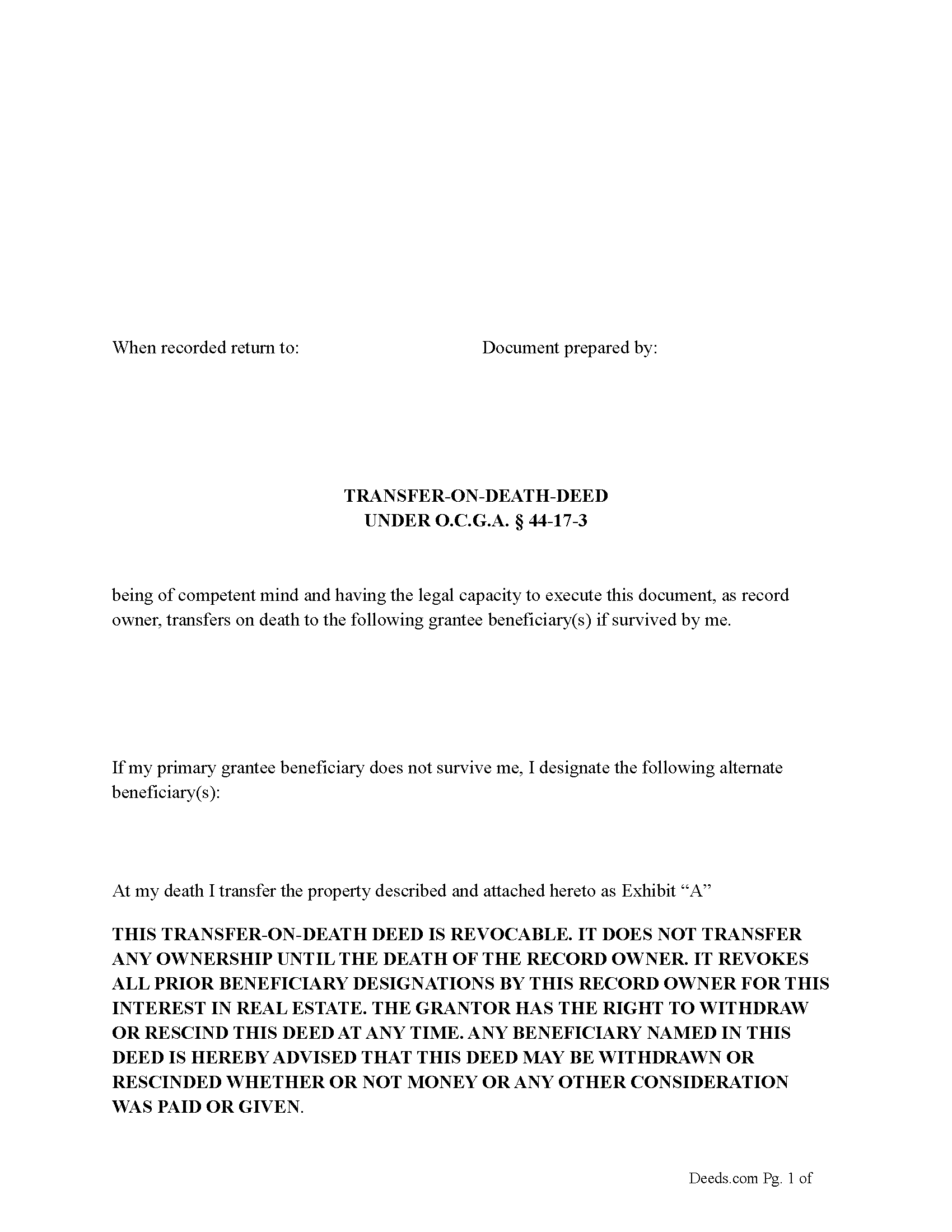Download Georgia Transfer on Death Deed Legal Forms

Georgia Transfer on Death Deed Overview

Georgia Law 496, effective July 1, 2024, introduced Chapter 17 regarding Transfer on Death (TOD) deeds. This new chapter affects the creation, execution, and enforcement of TOD deeds in the state. Here's how Chapter 17 affects TOD deeds:
Creation and Execution of TOD Deeds:
Property owners can now create a TOD deed to designate a beneficiary who will receive the property upon the owner’s death. The TOD deed must be executed with the same formalities as a regular deed, meaning it must be signed, witnessed, and notarized. The deed must clearly state that the transfer is to occur upon the owner’s death.
Recording Requirements: To be effective, a TOD deed must be recorded in the county where the property is located before the owner’s death. Failure to record the TOD deed properly may result in it being invalid, and the property would then be subject to probate.
Revocability: The owner retains the right to revoke the TOD deed at any time during their lifetime. Revocation must be executed and recorded in the same manner as the TOD deed itself. The revocation can be made by executing a new TOD deed that expressly revokes the previous one or by recording an instrument of revocation.
Effect on Ownership and Rights: During the owner’s lifetime, the TOD deed does not affect the owner’s rights or the property’s ownership. The owner retains full control of the property and can sell, mortgage, or otherwise manage the property without the beneficiary's consent. The TOD deed only takes effect upon the owner’s death.
Impact on Spouses and Joint Owners: If the property is jointly owned with right of survivorship, the TOD deed will only take effect after the death of the last surviving owner. Both joint owners must sign the TOD deed to ensure it accurately reflects their intentions. In the case of sole ownership, the consent of the non owning spouse may not be legally required but is advisable to prevent potential legal challenges based on marital property or homestead rights.
Priority and Creditor Claims: The TOD deed does not shield the property from the owner’s creditors. Any liens or debts must be settled before the beneficiary can take full ownership of the property. The property remains subject to any existing mortgages or liens, and the beneficiary will inherit the property subject to these encumbrances.
Homestead Rights: Georgia’s homestead rights and exemptions may affect the TOD deed. It’s essential to consider these rights, especially in cases where the property is the primary residence and may involve spousal consent.
Probate Avoidance: The primary advantage of the TOD deed under Chapter 17 is the avoidance of probate. Upon the owner’s death, the property transfers directly to the designated beneficiary without the need for probate proceedings.
Chapter 17 of Georgia Law 496, which governs Transfer on Death (TOD) deeds, includes definitions critical to understanding the application and implications of the law. Here are the explanations for the terms as used in this chapter:
((1) 'Interest in real estate' means any estate or interest in, over or under land, including surface, minerals, structures, fixtures, and easements. (GA 44-17-1(1))
This term is broadly defined to include any type of ownership or stake in real property. It encompasses:
Surface: Ownership or rights related to the surface of the land, including any structures or improvements on it.
Minerals: Subsurface rights, which can include the extraction of minerals, oil, or gas.
Structures: Any buildings or permanent improvements attached to the land.
Fixtures: Items that were once personal property but have been attached to the land or structures in a way that they are considered part of the real estate (e.g., a furnace or built-in cabinetry).
Easements: Rights to use another person’s land for a specific purpose (e.g., utility easements or access roads).
This broad definition ensures that TOD deeds can apply to a wide range of real estate interests, not just traditional ownership of land and buildings.
((2) 'Joint owner' means a person that owns an interest in real estate as a joint tenant with right of survivorship.) This term specifically refers to a person who co-owns an interest in real estate with one or more other people, where the ownership includes the right of survivorship.)
Joint Tenancy with Right of Survivorship: A form of co-ownership where each owner (joint tenant) has an equal share in the property. Upon the death of one joint tenant, their share automatically passes to the surviving joint tenant(s), rather than being distributed according to a will or through probate.
This definition is important for TOD deeds because it clarifies how ownership interests are managed when there are multiple owners. In the context of a TOD deed, if the property is owned as joint tenants with right of survivorship, the TOD deed would only take effect after the death of the last surviving joint owner. Both joint owners must agree and sign the TOD deed to designate a beneficiary who will receive the property upon the death of the surviving owner. (44-17-1(2))